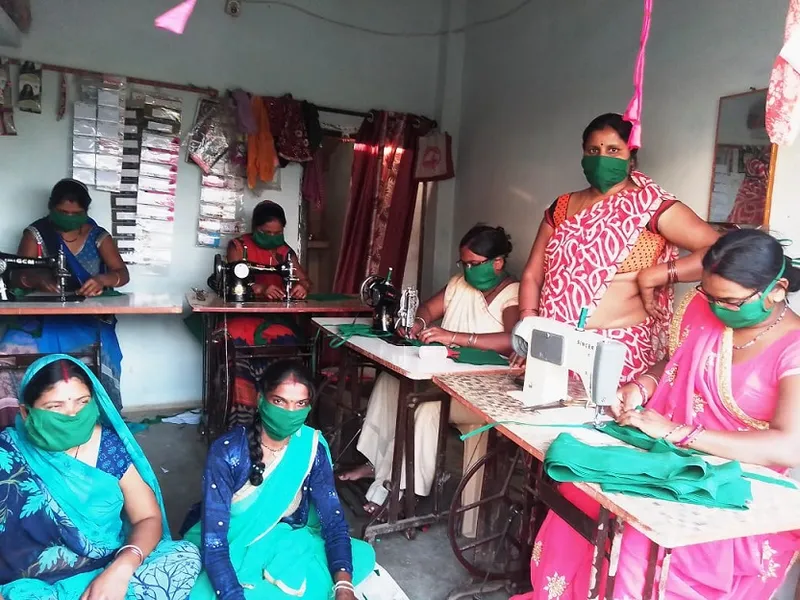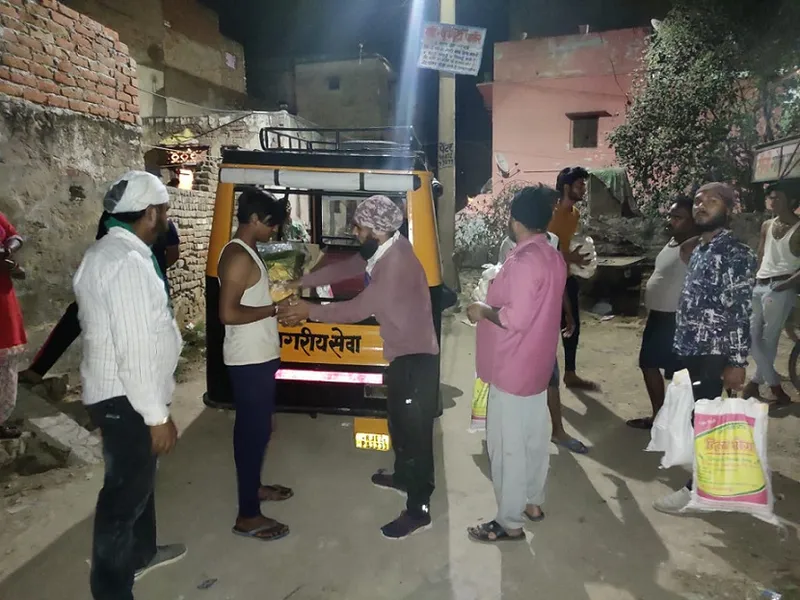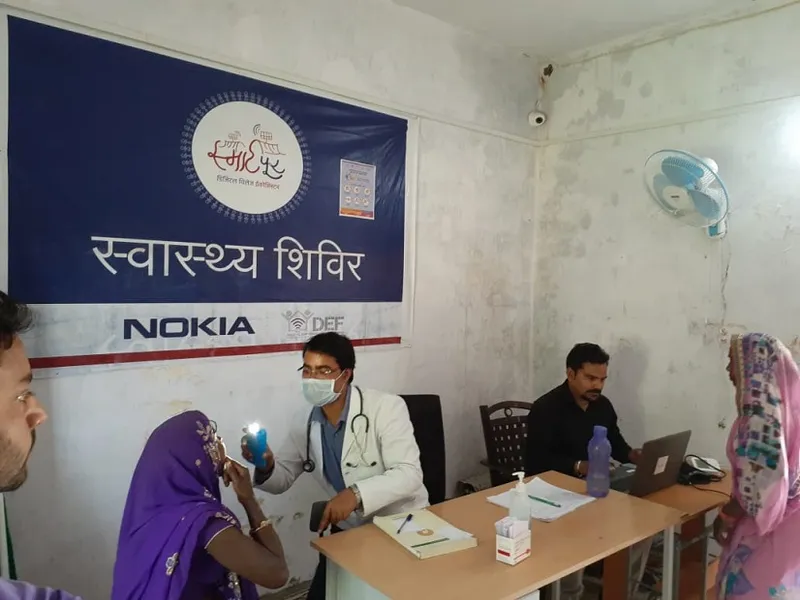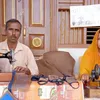Coronavirus: how this foundation’s rural internet centres are repurposing for relief operations
With 600 digital information and service centres in rural India, the Digital Empowerment Foundation is launching an emergency initiative to provide essential services for hard-hit communities.
The COVID-19 pandemic has major health, social, economic, institutional, and governance ramifications worldwide. In this unparalleled health crisis, over three billion people around the world are in lockdown. The hardest hit are the poor, vulnerable, low-income groups, and informal sectors.

Mask-making in Rewa
Existing assets, resources, and community groups are being repurposed in a number of ways to tackle the challenge. For example, Shivkumari, an internet saathi from Rewa, Madhya Pradesh, is producing 300 masks per day and is supplying to local hospitals.
At the time of writing, she had received an order of 16,000 masks from a government hospital, out of which she has delivered 2,500. There are several others who are preparing a sanitiser-making unit as well.
Internet saathis are digitally-skilled employees and volunteers at the Community Information Resource Centres (CIRCs) run by Delhi-headquartered Digital Empowerment Foundation. DEF has more than 600 such centres across 130 backward districts in 25 states of India.
Information services are provided in Hindi, Tamil, Telugu, Malayalam, Bangla, Odiya, Kannada, Urdu, Marathi, and English. In response to the pandemic, DEF launched the COVID-19 Digital Emergency Relief Program (C-DERP), in which the digital centres play a key role.
“The digital centres also double as manufacturing hubs for essential needs,” says Osama Manzar, Founder of DEF, in a chat with YourStory. The centres are targeted at the needs of the underserved communities in rural areas.
Essential services for hard-hit communities
To provide necessary kits like food and medicines for up to six lakh households within the next three to six months, DEF has allocated Rs 3 crore by raising funds from new and old funders. Donations are sought online as well.
A COVID-19 task force has been formed to undertake several initiatives to address concerns of local households and individuals at the panchayat level. These include COVID-19 entitlement services, money transfer, and grievance redressal.
According to an initial survey conducted by DEF on the impact of the lockdown in rural India, scarcity of food grains ranks at the top. Almost 36 percent of the respondents stated that food grains were not available at all.
This was followed by the dearth of sanitisers and masks according to 20 percent and 14 percent respondents, respectively. The online survey was conducted in the month of March, with around 3,000 respondents.
The government has announced that ration kits will be provided to all daily-wage labourers. To help speed up the process, Gurudev Singh, a DEF coordinator in Alwar, Rajasthan, along with the ward councillor, conducted a survey to prepare a list of those in dire need of these benefits. He created a kit which includes 500 grams cooking oil, 500 grams lentils, 5 kg wheat, and 1 kg rice, which was distributed to 45 households.
Similarly, DEF coordinators in Nuh (Haryana) and West Champaran (Bihar) have created a task force that has got permission from the district collector to help with core services. They include community outreach, mobilisation, and distribution of necessary items like food and medicines.
Pankaj Kumar, District Collector of Nuh, Haryana, gave permission to the DEF team to help with community outreach, mobilisation, and distribution of necessary items.
“The teams of volunteers are helping us reach the last mile for generating awareness and providing essential items through every means possible. We knew that we can count on them since they have been working with us regularly,” Pankaj affirms.

Ration supply in Alwar
Manufacturing and banking
After recognising the potential of some digital centres as manufacturing units for essential items like masks and sanitisers, DEF has been trying to replicate the model elsewhere as well. For example, women entrepreneurs from Gazipur, UP, have started stitching masks to help local authorities and healthcare centres in the area.
More than 150 masks a day are being prepared. “We are thankful to DEF for providing an alternate livelihood opportunity from home in this lockdown situation,” says entrepreneur Shilpi Gupta.
COVID-19 has drastically affected the banking sector as banks operate for a shorter duration of time and customers are under lockdown. “A lot of people throng our digital centre for banking services,” says Parvej Alam from Barabanki, UP.
To ensure that everybody is catered to while keeping safety measures in mind, his centre has set up a table outside for citizens to carry out online transactions.
Information and counselling services
During the lockdown, the internet has emerged as a core platform for information and access to entitlements and financial services. A DEF survey highlighted that the main source of information on COVID-19 for 53 percent of the respondents is through mobiles, with WhatsApp ranking the highest.
Physical and mental health counselling has also emerged as an important need, due to the strains on livelihood and income opportunities, nutrition, and social stability. Tele-health services in some centres are aiding with consultation and counselling.
The digital centres and their network of over 10,000 foot soldiers are conducting awareness campaigns for citizens to identify and tackle fake news and rumours. This can help reduce panic, myths, and misconceptions.
DEF has prepared a COVID-19 information resource kit covering health tips, background resources, and checklists of dos and don’ts. Volunteers and donors can contact DERP via email or phone (97188-19566).
The foundation is also active in preserving local folk music forms via websites and videos. One of the folk musicians in their network, bhapang artist Yusuf Khan from Alwar, Rajasthan, has composed a song to increase awareness about COVID-19, called Defeat Coronavirus.

Health awareness campaign
The road ahead
The aim of DERP is to reach more than three lakh households in need. Simultaneously, the organisation has created the COVID-19 Digital Volunteer Force (C-DVF), a 600-member cadre for facilitation and delivery of these services. The idea is to create a model that can be replicated and scaled up for the current pandemic, and others in the future.
“Our aim is to provide immediate relief to around 15 lakh citizens at the panchayat level in 300-500 locations in India,” says DEF’s Osama. Additionally, their digital centres can help more women and men seek alternate livelihood opportunities through COVID-19 solutions like making masks, sanitisers, and food products for distribution.
“The pandemic has pushed us into maintaining social distancing, but the challenge is also to remain hyper-connected via the internet and isolate COVID-19,” he observes. This is therefore a crucial time for building community relations and trust. “We stand together in this fight against COVID-19,” Osama signs off.
(Edited by Teja Lele Desai)









